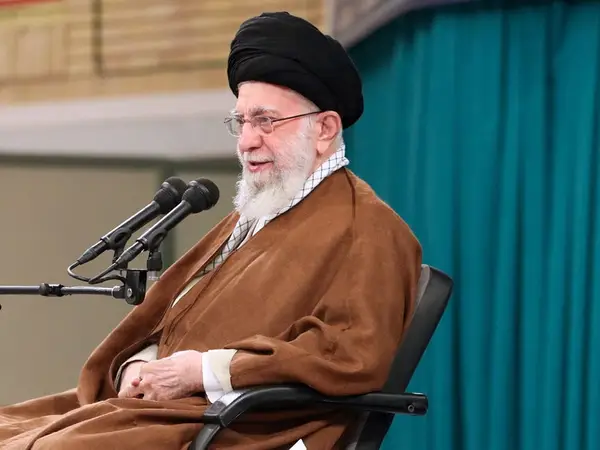An “honorable” foreign policy that rejects supplication should be the guide for Iran’s diplomats, Supreme Leader Ali Khamenei said in a speech on Saturday.
Khamenei addressed foreign ministry officials and ambassadors at a time when his foreign policy of defying the West has become more controversial in Iran amid a serious economic crisis.
Khamenei set out to explain and clarify the principles and standards of “a successful foreign policy” focusing on three keywords: Honor, wisdom, and expediency.
A foreign policy based on supplication in words or in essence, and begging for favors from foreign powers is doomed, Khamenei said. He urged diplomats to respond to the words and actions of others reciprocally and “with honor.”
The 83-year-old authoritarian ruler also emphasized the need for wisdom in foreign policy. In a statement urging caution, he said that “uncalculated and dismissive” decisions and actions in the past have harmed the country.
Iranian officials and politicians, however, usually take their cue from Khamenei, especially in foreign policy matters. His past statements against regional countries such as Saudi Arabia, Israel, or the United States and Europe have led to more provocative statements by his underlings.
But the Supreme Leader often speaks with double meanings, leaving room for himself to shirk responsibility if a certain policy proves to be a failure.
Khamenei used this tactic during nuclear negotiations a decade ago. While approving the policy of talks and compromise, he also warned that other nations could not be trusted, and a nuclear deal might prove to be disadvantageous.
He followed the same tact on Saturday, saying that the principle of using ‘wisdom’ also means not to unnecessarily trust what other countries say, although sometimes they are sincere. He has repeatedly said in the past that the United States and its allies cannot be trusted.
Khamenei in his speech used the Islamic concept of 'Taqiyya' to describe the regime's decision to accept the 2015 JCPOA nuclear deal with the West. Taqiyya means the permissibility to deny or conceal one's real beliefs to secure a worthy goal.
Khamenei’s emphasis on “expediency” as the third principle in foreign policy was particularly notable, as he urged flexibility “in necessary instances” and circumventing “tough barriers” to continue a set course.
His mention of ‘flexibility’ was a reference to his famous phrase of “heroic flexibility” in 2013, when he signaled his permission for nuclear talks to begin.
“Of course, a few years ago when ‘heroic flexibility’ was mentioned, some abroad and in Iran had the wrong take on it. Expediency means finding ways to circumvent difficult obstacles and pursuing the same path,” Khamenei clarified.
In the context of Iran's nuclear program, this remark could mean that Khamenei justifies negotiations as a way of continuing to pursue the same goal by going around the opposition of other countries.
Commentators and many politicians in Iran have been increasingly calling for a flexible foreign policy and accommodation with the West, while the public knows that Khamenei makes all the key decisions.
With annual inflation reported to be near 70 percent and the Iranian currency losing half its value in the past year, with popular anti-regime protests and labor strikes, Khamenei finds himself in a tough position. However, so far, there is no indications of a foreign policy shift, except an agreement to restore diplomatic ties with regional rival Saudi Arabia.
Khamenei in his speech urged his foreign policy establishment to work hard for improving ties with regional countries, blaming “the enemy for doing everything” to drive a wedge between Iran and its neighbors.
In Khamenei’s lexicon, ‘the enemy’ refers mainly to the United States and Israel and to a lesser extent to other US allies, including European powers.
